 • National Leadership of the UDM
• National Leadership of the UDM
• Provincial and regional leaders of the party
• UDM members and supporters
• Fellow South Africans
1. Introduction
A big thank you goes out to the United Democratic Movement (UDM) leaders and activists who have worked tirelessly in our campaigns over the past few months.
The UDM does not have the luxury of spending millions of rands on our electioneering.
But, we managed to stage a successful campaign with the flighting of billboards, putting up posters, handing out flyers and talking to the voters during our door-to-door canvassing. We also achieved our goal of successfully launching our manifesto in Port Elizabeth with thousands of South Africans in attendance.
We can proudly say that we have worked as hard as we possibly can; and hold our heads up high.
What we did not have access to is the constant media coverage that two political parties have enjoyed. We do however thank some media houses who covered us during this period.
The Independent Communications Authority of South Africa (ICASA) and the Independent Electoral Commission (IEC) have a responsibility to promote multi-party democracy and to ensure that news providers comport themselves in an ethical and unbiased manner.
By not fulfilling their mandates and not enforcing the rules and regulations, these bodies have failed to ensure fair coverage of all political parties in these elections.
2. Another five years of corruption
The bulk of the millions of registered voters will cast their votes on Wednesday.
They will be cognisant of South Africa’s faltering economy that has produced jobless growth, and the situation has been compounded by corruption and maladministration – especially over the past ten or eleven years.
It’s up to the voter to assess the status quo and decide what kind of leadership they want for the future.
The commissions of inquiry, especially the Zondo commission, have unmasked a common denominator in the years of nauseating corruption and lies we hear about these days.
We have heard how Bosasa and the Guptas have bankrolled the African National Congress (ANC).
We erroneously thought that the former president and some of his cabinet ministers were the sole perpetrators of corruption.
However, the revelations at the Zondo Commission tells another deeply distressing story. We now realise how Bosasa bought the top echelons of the ruling party.
You will recall that the UDM, together with other opposition parties, have sought the constitutional court’s intervention on several occasions in an effort to fight the ruling parties’ looting and misrule over the past nine years.
Had it not been for the opposition, there would not have been any change in government’s leadership. It is time for the voters to recognise the contribution we made to root out corruption.
Voters must realise that the ruling party’s so-called, self-correcting nature, is a myth.
The question voters must now ask themselves is this: “Do we want another five years of corrupt ANC rule?”.
Should they get a simple majority, we are definitely in for more of the same.
We will have the same corrupt individuals at the helm, and South Africa simply cannot survive under these conditions.
We have seen first-hand how they operate.
We know that the comrades in corruption see nothing wrong with their misdeeds and don’t care that our people are paying the price.
What is worse is that they are not even ashamed of their blatant lies.
We know that state institutions have become the private banks of the ruling elite. We, for example, know how the Public Investment Corporation wrote off billions of the Government Employees Pension Fund (GEPF) monies.
We now know how a choice group of people, built empires using pensioners’ monies, making investments that has yielded no results and risked hundreds of thousands of pensioners nest eggs.
The civil service wage bill remains cause for concern. This burden on government’s resources, is exacerbated, because of the overreliance on consultants. Civil servants, simply cannot do the jobs they are appointed to do.
The side-effect of this system is that big business has ingratiated itself with the ruling party as they line up for lucrative government tenders; and they do this without investing that money to create more jobs.
The greedy will continue to milk the system ignoring the fact that Jacob Zuma was not alone in his corrupt activities.
It is not in their best interest to support other political parties. It would rather suit big business to, notwithstanding the ruling party’s gross failures, support Cyril Ramaphosa as if he is an individual free of political ties.
What nonsense is this?
People should not be surprised when they see this narrative repeated if the status quo remains.
How much more proof does the voting public need to say no to another five years of ANC rule?
3. One party dominance
One-party dominance breeds corruption. Multi-party democracy ensures that we have a government system that has the checks and balances built in. We have to fight for this system.
The simple truth be told, should the current ruling party get a simple majority:
• Looting of state resources will not end;
• Instead of growing a bigger economic cake, economic depression will continue;
• Dreadful joblessness will endure;
• Our clinics will still not be equipped to take care of our people’s health needs;
• Our education system will remain in tatters;
• Our roads and infrastructure will further deteriorate;
• The tolerance for crime and lawlessness will continue;
• Environmental problems such as poor waste management will continue to plague informal settlements and townships;
• Societal ills, such as alcohol and drug abuse, will never be rooted out;
• We will still have elite projects, like the eToll system, impacting on businesses and workers, and;
• We will still have a government of no consequences.
After a twenty-five-year track-record, the ANC still has the temerity to campaign on the anti-corruption ticket.
Given its reputation, why would the voting public give them another chance?
4. Free and fair elections
South Africans demand free and fair elections. The world has their eyes on us. Investors are holding money at bay to see what happens.
We have heard scary stories of how elections in other countries were rigged through the sophisticated hacking of results.
We hope that the IT companies the IEC has appointed will not fall into this trap. If such a thing should happen, the IEC’s independence will mean nothing and our elections would hold no value.
We also call on our colleagues in other political parties to watch the IEC like hawks. Our voting agents should make arrangements to rotate so that we can always have fresh eyes on the voting processes.
We must be especially vigilant when it comes to the marking of the voters roll, to ensure that crooks don’t cast more than one vote.
5. What are the first things the new government should attend to?
Priority number one for a new government should entail a broad approach, with the public and private sectors included, to create sustainable jobs.
The role of government should be ironed out. It’s of no use to rattle off numbers, saying that so many millions of jobs will be created, whilst we see people being retrenched.
Once this exercise is completed, we can say how many jobs will be created where e.g. in the agriculture and the textile industries.
We need to stop the mass dumping of goods in South Africa from countries like China, Brazil and India, whilst we should be creating local jobs.
The time for folding our arms is over and government has a responsibility to intervene to stop unfair competition with other countries who heavily subsidise their industries.
6. Closing
The UDM’s message to the voting public is to apply your minds and vote wisely.
Consider what we have said today when you make your cross on the 8th.
For a corruption-free government, vote UDM!
Thank you












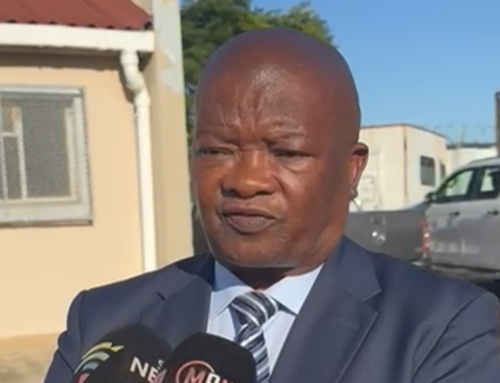



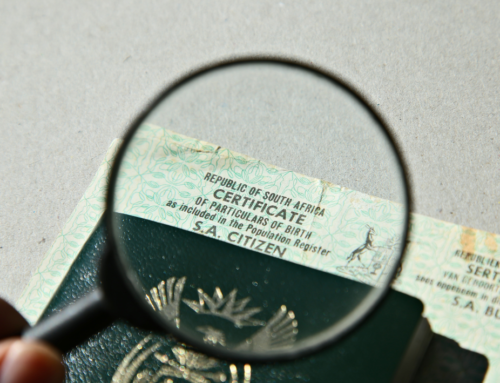
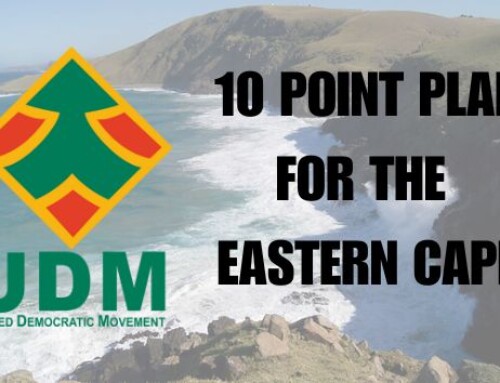





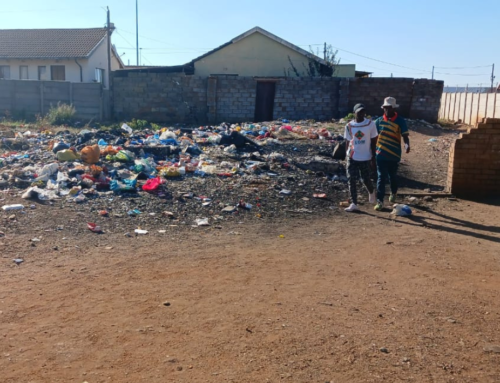
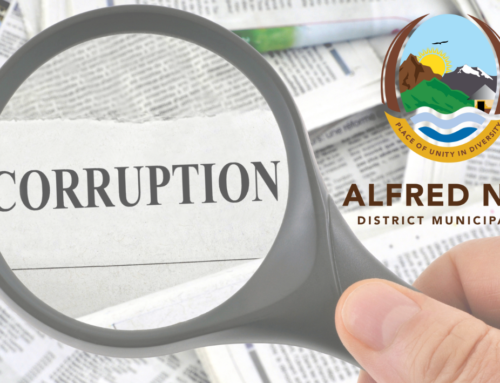
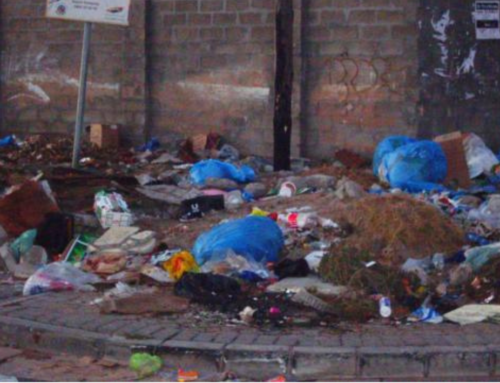
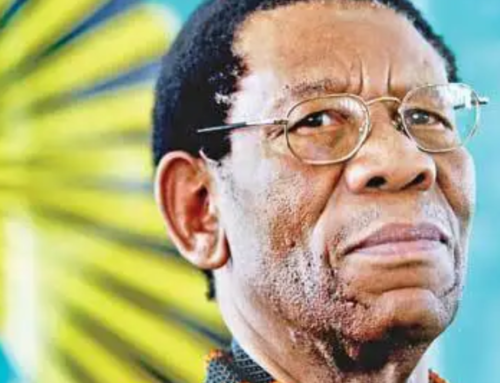

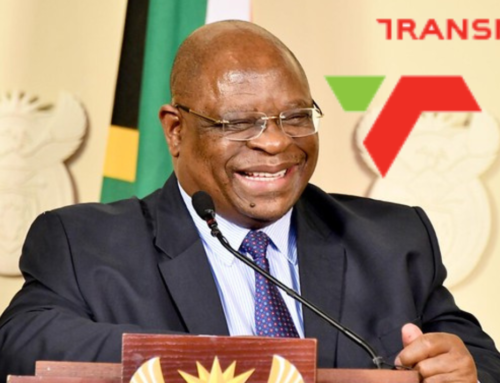
Mr President
As much as I’m shocked and disappointed by how we performed in these elections but I’m not surprised.Udm have not been visible enough after 2014 and hope after these election you will go back to the drawing board and take stock.
Udm can make an impact in South African politics but needs a total revamp and relaunch,grow or build branches up because I remember in times of the consultative process in the build up to forming Udm you were all over the country getting people’s views and that have stopped and it shouldn’t have after the 2014 election because signs were there to be seen that UDM is losing its support base.
Let’s go back together to the grassroots in preparation of the forthcoming elections.
Kind Regards